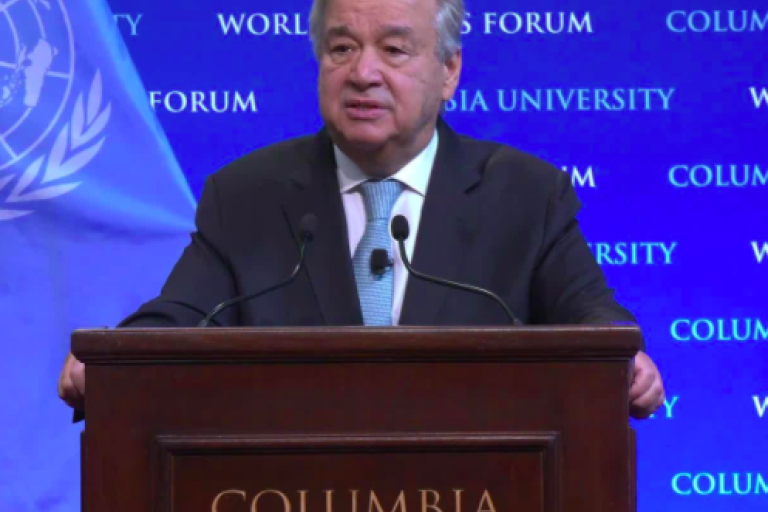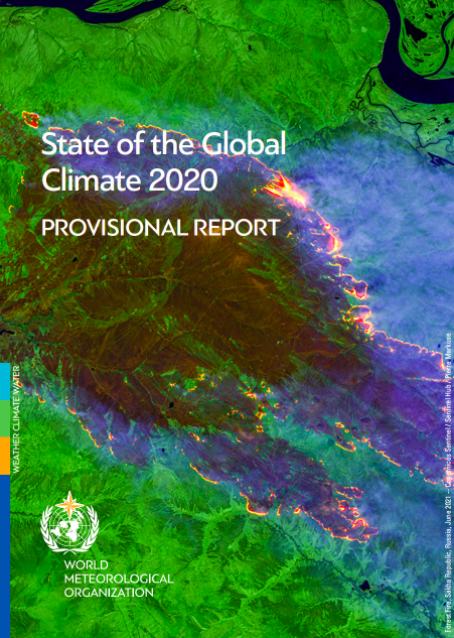UN chief: this is a moment of truth for people and planet
UN Secretary-General António Guterres delivered a landmark speech on the state of the planet at Columbia University in New York on 2 December, setting the stage for dramatically scaled-up ambition on climate change over the coming year. He drew heavily from WMO’s provisional report on the State of the Global Climate

UN Secretary-General António Guterres delivered a landmark speech on the state of the planet at Columbia University in New York on 2 December, setting the stage for dramatically scaled-up ambition on climate change over the coming year.
Mr Guterres drew heavily from WMO’s provisional report on the State of the Global Climate and a separate “Production Gap” report from the United Nations Environment Programme, which states that to limit temperature rise to 1.5-degrees Celsius as set out in the Paris Climate Change Agreement, the world needs to decrease fossil fuel production by roughly 6% every year between now and 2030.
“Making peace with nature is the defining task of the 21st century. It must be the top, top priority for everyone, everywhere,” said Mr Guterres.
The U.N. Secretary-General highlighted some of the key findings of WMO’s State of the Global Climate report, which was released at a press conference by WMO Secretary-General Prof. Petteri Taalas and received global media coverage.
2020 is on track to be one of the three warmest years on record globally – even with the cooling effect of this year’s La Nina, according to the WMO report.
Other highlights of the report - which combines input from UN agencies, National Meteorological and Hydrological Services and many experts - cited by Mr Guterres included:
- The past decade was the hottest in human history.

- Ocean heat is at record levels.
- This year, more than 80 per cent of the world’s oceans experienced marine heatwaves.
- In the Arctic, 2020 has seen exceptional warmth, with temperatures more than 3 degrees Celsius above average – and more than 5 degrees in northern Siberia.
- Arctic sea ice in October was the lowest on record – and now re-freezing has been the slowest on record.
- Greenland ice has continued its long-term decline, losing an average of 278 gigatons a year.
- Permafrost is melting and so releasing methane, a potent greenhouse gas.
- Apocalyptic fires and floods, cyclones and hurricanes are increasingly the new normal.
- The North Atlantic hurricane season has seen 30 storms, more than double the long-term average and breaking the record for a full season.
- Central America is still reeling from two back-to-back hurricanes, part of the most intense period for such storms in recent years.
- Last year such disasters cost the world $150 billion.
- COVID-19 lockdowns have temporarily reduced emissions and pollution.
- But carbon dioxide levels are still at record highs – and rising.
- In 2019, carbon dioxide levels reached 148 per cent of pre-industrial levels.
- In 2020, the upward trend has continued despite the pandemic.
- Methane soared even higher – to 260 per cent.
- Nitrous oxide, a powerful greenhouse gas but also a gas that harms the ozone layer, has escalated by 123 per cent.
“Meanwhile, climate policies have yet to rise to the challenge, “ said Mr Guterres. “Emissions are 62 per cent higher now than when international climate negotiations began in 1990.
“Every tenth of a degree of warming matters. Today, we are at 1.2 degrees of warming and already witnessing unprecedented climate extremes and volatility in every region and on every continent. We are headed for a thundering temperature rise of 3 to 5 degrees Celsius this century,” he said.
“The science is crystal clear: to limit temperature rise to 1.5-degrees Celsius above pre-industrial levels, the world needs to decrease fossil fuel production by roughly 6 per cent every year between now and 2030,” said Mr Guterres.
Mr. Guterres said he also saw hope, and pointed to the many solutions already within reach to solve the present crisis. He spoke of the COVID pandemic as presenting an opportunity: “COVID recovery and our planet’s repair can be two sides of the same coin,” adding that it was time to flick the “green switch.”
He said the international community has a chance to not simply reset the world economy, but to transform it to a sustainable one driven by renewable energy that will create new jobs, cleaner infrastructure and a resilient future.
Mr. Guterres cited three imperatives in addressing the climate crisis: First, achieving global carbon neutrality within the next three decades. Second, aligning global finance behind the Paris Agreement. Third, delivering a breakthrough on adaptation to protect the world – and especially the most vulnerable people and countries -- from climate impacts.
This is a “moment of truth for people and planet alike”, he said, where the global community must take a collective step towards a safer, more sustainable and equitable path, with the Sustainable Development Goals and the Paris Agreement on climate change as a blueprint.
Details of the UN Secretary-General’s speech are here
The WMO provisional report on the State of the Global Climate and digital assets are available here










